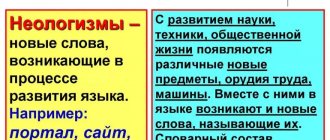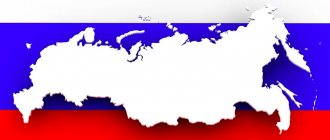Groups of loanwords
Borrowings according to the degree of penetration into the vocabulary of the Russian language can be divided into three groups.
1. The first group includes words that have long been included in the Russian language, have been firmly assimilated by it and are not perceived by native speakers as foreign:
- school (Greek)
- class (lat.)
- briefcase (French)
- backpack (German)
- gymnasium (Greek)
- college (English)
- pioneer (English)
- barn (Turkic)
- Olympics (Greek)
- encyclopedia (French)
- suit (Italian)
- tea (Chinese)
- whip (scand.)
- silo (Spanish), etc.
The word “bread,” which has long been included in our speech, was borrowed by the Slavs from the ancient Germanic language. Nowadays, only linguists can figure out its “foreignness”.
This group of long-borrowed lexemes also includes everyday words:
sugar, cabbage, lantern, plate, heel, beets, doll, bed, bazaar, etc.
Many foreign words related to education and politics have become in demand due to the need to name a new concept that has already been invented by another people:
anatomy, democracy, dictatorship, philosophy, student, dean, audience, etc.
Maritime terms (sailor, harbor, pilot, boat, etc.) were also borrowed from the Dutch language. Many musical terms were learned from the Italian language (sonatina, symphony, piano, baritone, aria, soprano).
Russian people altered some foreign words in their own way. For example, from the German word Jahrmarkt, which literally means “annual market,” “fair” arose, and the German Teller on Russian soil turned into a plate.
2. A significant group consists of borrowed words, known to all native speakers and being the only name for the designated concepts. They retain their foreign language characteristics:
- sidewalk
- sandwich
- pajamas
- service
- floor lamp
- foxtrot
- shade
- Taxi
- purse
- trolleybus
3. Foreign words that are limited to the speech situation and are not widely used. You can feel their bookish character. This group includes words that have analogues in Russian:
- association - community, union;
- contract - agreement;
- tender - competition;
- punctual - precise;
- ignore - not notice;
- exaggerate - exaggerate;
- consensus - agreement;
- conservative - stagnant
etc.
Classification
Borrowings in modern Russian can be divided into several groups in different ways. The first acceptable classification is by source, that is, by the language from which the word came. Each language has its own term. Thus, English borrowings in modern Russian are usually called Anglicisms, Czech ones - Bohemisms (because the historical name of the region is Bohemia), French - Gallicisms (from Gaul). Words that came from Hungary are called Magyarisms or Ungarisms, and from any eastern language - Orientalisms, and so on.
Another way of classification is by type of contact, this was already mentioned above: either directly, or with the help of an intermediary, or orally, or in writing (through books). By the way, the latter method was often resorted to by artists, finding and reviving archaisms (old words not used today) in their masterpieces - for example, Richard Wagner or Alexei Tolstoy.
The third category is the method of borrowing: the entire word or some part of it can pass into a new language (both will be lexical borrowing), in addition, an existing word may have a new meaning (semantic borrowing).
Finally, all foreign language borrowings in the modern Russian language can be classified into necessary and unnecessary, in other words, justified and unjustified. The first category will include those words that had no analogues in the language before their appearance, and their appearance was necessary to describe a particular phenomenon and/or object. There are a great many such words, for example telephone, mixer, snowboard, chocolate, bowling and the like. These lexemes filled the gaps in our language, so their appearance is justified.
A completely different matter is foreign words that appear in the Russian language as a synonym for existing concepts: “message” - “message”, “goalkeeper” - “goalkeeper” and the like. As a rule, such equivalents are just anglicisms and are associated with the general fashion for everything English and American, associated with “equalization” to these countries. Meanwhile, the presence in the language of words that duplicate each other ultimately leads to the elimination of one of the synonyms from speech. It is impossible to predict which word will disappear - your own or a borrowed one.
Modern borrowings
All modern languages tend to use foreign words. The reasons for borrowing are close economic, political, cultural and other ties between different countries.
The process of replenishing the language with new words occurs in different ways: through oral speech, through written sources and other languages.
Lexical borrowing from a foreign language enriches the Russian language without violating its grammatical structure and internal laws of development.
Over the past few decades, the vocabulary of the Russian language has increased due to rapid scientific and technological progress, universal computerization, and significant changes in politics, economics and culture.
New objects and concepts arose that gave rise to words:
- summit
- monetarism
- manager
- rating
- roaming
- computer
- monitor
- file
- laptop
- cursor
- hacker
- charter
- showman
etc.
In our speech, one borrowed word can replace entire phrases:
- remix - a new performance or arrangement of a well-known melody;
- motel - hotel for autotourists;
- freestyle - downhill skiing performing various figures;
- sprint – short distance running;
- flyer - an advertising leaflet giving the right to a discount when paying for an entrance ticket;
etc.
In modern Russian, borrowed words make up approximately 15% of the total vocabulary. Russian words are also in demand in other languages. The most popular Russian words are “tsar”, “vulgarity”, “vodka”, “borscht”, “icon”.
Table of characteristics of borrowed words
| Sign | Explanation | Examples |
| Letter "A" at the beginning | Words in Russian do not begin with this sound. The presence of the letter “A” at the beginning distinguishes a foreign word from a Russian one. | profile, paragraph, lampshade, attack, angel |
| Letter "F" at the beginning | If a word begins with this sound, then it is a word of non-Russian origin. The letter "F" was created just for foreign words. | fact, forum, lantern, film, folklore |
| Letter "E" at the beginning | This initial sound also indicates a foreign language origin. Original Russian words do not begin with the letter “E”. | era, era, effect, exam |
| Combination of vowels | In foreign words, a combination of vowels is most often used. | punctuation, radio, veil |
| The presence of a large number of vowels in one word. | If the same sound is often repeated in a word, then this may also indicate the foreign origin of the word. Such words are most often distinguished by sound. | ataman, caravan, drum |
In modern speech, borrowed words can be recognized by their characteristic features:
- initial letters “a”, “e” (absurd, obstetrician, shareholder, era, exam);
- unstressed vowel [o] at the end of a word (cocoa, solo, sorghum);
- the consonant sound before the letter “e” is pronounced firmly (delta, coupe, puree, breeches, purse, synthesis, interview, thesis)
- double consonants in the root of a word (column, opponent, rack, platform, session);
- combinations of “bu”, “vu”, “kyu”, “mu”, “nu”, “pu”, “ryu”, “fu” (bulletin, engraving, cure, communiqué, muesli, nuance, parvenu, music stand, dressing table , fuselage);
- final letter combinations -an, -azh, -ant, -ent, -ing, -men, -tor, -er, etc. (cardigan, plane tree, vernissage, nominee, impeachment, briefing, businessman, consignor, producer, dealer, biker );
- fusion of vowel sounds (maestro, convertible, croissant, oasis, laptop, promoter);
- a combination of the letters “yo”, “ye”, “yo” (mayonnaise, pedestal, play, rentier, pavilion, battalion, canyon);
- indeclinable nouns and adjectives (protégé, jelly, muffler, avocado, mini, sushi, cockatoo, indigo).
German loanwords in Russian
The earliest borrowings from German were recorded in the Russian language back in the thirteenth century. These are words such as master, knight, duke, penny, pound and others, and they are found, as a rule, in various kinds of charters and chronicles. A large amount of German military terminology replenished the Russian language in the seventeenth century (for example, soldiers), and in the era of Peter there appeared such German borrowings in the Russian language as chisel, drill, workbench, waxing, paste - words characteristic of a working person.
The majority of the population does not even realize that many lexemes of our language are actually native German. Meanwhile, such words as, for example, fraer, iceberg, car, tie, torch, date, grind, tomato, painter, paramedic, post office, locksmith, huntsman, mouthpiece, button, apron, washer, canister, sleeve are famous for their German origin , howitzer, barrier, arsenal, landscape, aiguillette, flute, horn, fireworks and many, many others.
Use of borrowed words
The striking feature of linguistic development at the end of the 20th century is the active borrowing of words mainly from the English language in its American version. If in 60-90 approximately 9-10 thousand borrowings appeared, then since 1990, more than 30 thousand foreign words have poured into Russian speech in a stormy stream. This number significantly exceeds the vocabulary of even a highly educated person. According to the latest data, the active vocabulary of a modern person is 9 - 13 thousand words. For comparison, here are the following numbers:
A. S. Pushkin used 21 thousand words in his works and letters, Sergei Yesenin - about 19 thousand, Cervantes - 17 thousand.
Foreign words differ in their scope of use; they are mainly used in book speech. In recent decades, it has borrowed especially many words
- sphere of politics (inauguration, publicity, summit, rating, electorate);
- economics (audit, barter, broker, distributor, marketing, management, office, offshore);
- mass culture (underground, bestseller, image maker, showman, music video maker);
- computer equipment (banner, browser, pager, server, file);
- fashion (makeup artist, bermuda shorts, blazer, boutique, casting), etc.
Native speakers, when choosing foreign words, must take into account their lexical meaning, stylistic coloring, usage, and compatibility with other lexemes. Ignoring these criteria for the use of borrowed words leads to tautological errors:
- examination session;
- reach a milestone;
- strange paradox;
- first debut;
- free vacancy, etc.
It should be remembered that a foreign word should be used only when it is necessary to accurately designate a new concept, which has no analogue in the Russian vocabulary.
Excessive use of foreign words clogs the language, complicates communication between people and ultimately leads to the loss of its originality.
In our time, as a national treasure, the Russian language needs to be treated with care. The words of I. S. Turgenev are still relevant:
Take care of the purity of your language as a sacred thing! Don't use foreign words. The Russian language is so rich and flexible that we have nothing to take from those who are poorer than us.
Thus, a borrowing is necessary, which names a concept that did not exist in the language before (yogurt, the Internet, ikebana).
An unjustified borrowing is a word that is introduced from a foreign language as a synonym to define a concept that already exists in the Russian language.
Let's observe:
- contract (agreement);
- consensus (agreement);
- goalkeeper (goalkeeper)
- presentation (performance);
- installation (exhibition);
- pluralism (diversity);
- incident (incident);
- optimal (suitable;)
- parking (parking);
- casting (viewing);
- modernization (update);
- innovation (novelty);
- comfort (coziness)
etc.
At the same time, many of the foreign words decorate modern speech, making it more informative and expressive. However, we should not forget that an excessive abundance of borrowed words in the speech of a modern person can lead to undesirable consequences: our language can dissolve in a huge number of borrowings, lose its nationality and identity.
Why are they needed?
Why can’t a language develop on its own, without outside interference? What is the role of borrowing? Why are they so necessary - and these are not big words, they are really needed.
First of all, it is worth recognizing the fact that the process of borrowing is characteristic of any language; it is a normal and even inevitable phenomenon. They play a truly important role for the language, which absorbs new words. Firstly, in this way he is enriched, his vocabulary increases. Secondly, language and speech are a direct and immediate reflection of the relationships between different nationalities and nationalities. Thirdly, borrowings often act as a “transmitter” of new word-forming morphemes, thanks to which new words subsequently appear (we will return to this issue in more detail a little later).
Borrowings are necessary when the native language completely lacks a word to express a particular concept. This situation is considered the main reason for their appearance and the most popular. Borrowing then acts as the “savior” of the host language. A close (but not the same) reason for the appearance in a language of new words from another source language is the emergence of new objects that require one or another nomination. In addition, in some cases, borrowing words in the modern Russian language appear as a kind of tribute to fashion. Another reason lies in the fact that often in the Russian language there is a whole expression to denote a concept, while foreigners use only one word. This reason can be briefly described as “convenience”.
The need to fill gaps in the expressive means of language also leads to the emergence of foreign borrowed words. By the way, such a (foreign) word often, in the opinion of many, sounds better, it is more respectable, more pretentious, more prestigious - and this also gives a reason to take it for yourself. There are a lot of reasons for borrowings in the modern Russian language - another question is whether they are really always so necessary and used exclusively on their merits. We will return to this issue a little later.








